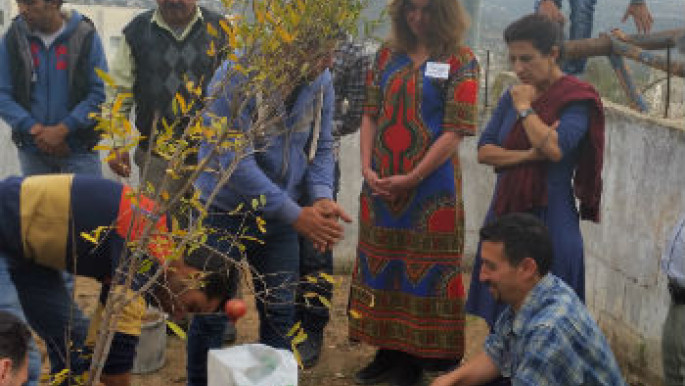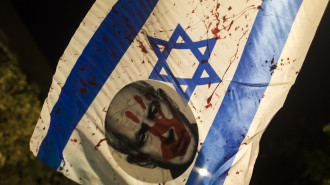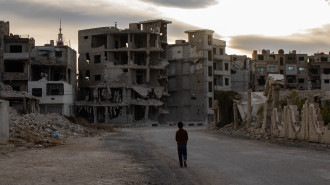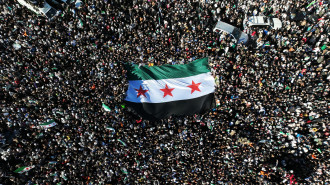Breadcrumb
Green resistance: Building Palestine's first eco-village
Farkha, a small village of around 1,500 people in the northern West Bank known for its Communist organisation, is set to be Palestine's first member of the Global Ecovillage Network.
7 min read
Farkha is a village coming together to sow its own destiny [Alice Gray/alAraby]
Baker Qambaz is the mayor of Farkha, as well as being a founding member of the town's organic olive oil cooperative. He is one of the primary forces behind the move for Farkha to become an eco-village.
"The people who most need to unite in this world are the reds and the greens," he told al-Araby, gazing out from the balcony of his home over a terraced mountainside studded with ancient olive trees.
An eco-village is defined as a community which is aiming to become socially, economically and environmentally sustainable: harmlessly integrating human activities into the natural world in a way that could continue indefinitely.
"It is the love of life and the belief in the advancement of humanity that unites communists and environmentalists globally," Qambaz said. "Honest and determined people who are prepared to stand for what they believe in can create a better world. I do believe that."
Farkha's ambitious plan for community scale sustainability is based on a coalition between the existing cooperatives in the town - the olive oil group, a women's co-op and the local cultural centre - and civil society institutions such as schools, kindergartens and mosques.
"Our communist traditions help us to organise ourselves effectively," says Qambaz's son, Mustafa, who is an active member of the olive oil co-op and keen to experiment with ecological farming techniques on his own land.
"We have a strong sense of community and cohesion. To be honest, I never want to leave this village because I wouldn't know how to live without the people around me."
Farkha's village council has been dominated by communists since the 1950s - and murals of Che Guevara and Hugo Chavez are everywhere to be seen.
"In the 50s, Salfit was known as 'Little Moscow', but now we are stronger than them," laughs Qambaz. "Whoever is not a communist here would feel ashamed, and our parties have achieved the most in social and economic organisation in the village for decades. We have something special: we either do or do not, we are or are not. If we take something on we carry it through to the end."
Fairtrade organic olive oil
Much of the inspiration for the ambitious plans that would see Farkha become a sustainable community with renewable energy, ecological farming and sustainable water and waste management strategies came to Qambaz while he was setting up the organic olive oil co-operative, during trips to France and Morocco.
"We set the co-op up in 2008 because we were facing huge problems marketing our oil at that time. We couldn't even recover our production costs," he said. "We were selling oil at 1.5 euros per litre when it cost us 2.5 euros per liter to produce.
"So we started with a group of nine farmers: surveying the land and applying for organic certification from the Egyptian Arab Institute. At the same time, we applied for Fairtrade certification. Then we were able to start marketing our oil for a fair price on the international market.
"It was at about that time that I met Haime Alberto, a Jewish French activist who became like a brother to me. He had been an Israeli citizen in the past, but he left in 1969 because he was so disgusted by the occupation. He worked for a French organisation called 'Friends of Land and Humans' and invited me to travel to their projects in Morocco in 2009 and France in 2010 where I saw many amazing examples of permanent culture in action: food, energy, water, waste management. Everything. It was then that I started to think: we could do this in Farkha."
Through Alberto, Qambaz became better acquainted with a Palestinian agronomist and proponent of ecological farming, Sa'ad Dagher, who introduced him to the Global Campus project of the Tamera Peace Research Centre and the Global Ecovillage Network (GEN), as well as joining the effort to create a demonstration farm for ecological farming techniques in Farkha.
"We discovered a huge army of people around the world who were willing to stand behind us," said Qambaz. "This is our strength. And it's not just about Farkha - we are part of a larger movement for a life of freedom and dignity in Palestine."
Eco-village design education
When al-Araby visited Farkha, an "Ecovillage Design Education" course was in full swing, attended by more than 20 Palestinian students from both Farkha itself and further afield, as well as a handful of international students, and run by activists from Portugal's Tamera Peace Research Centre, and trainers from the Global Ecovillage Network.
The funding for the course was obtained from the German Foreign Ministry.
Aida Shibli is the coordinator of the "Global Campus Palestine" project and is a Palestinian woman from Shibli village in the Galilee who now lives at the Tamera Peace Research Village in Portugal - a radical community seeking to create a post-capitalist societal model for a world free of violence and fear.
Tamera are pioneers in ecosystem restoration through the creation of water-retaining landscapes as well as leading innovators in building systems for sustainable living and self-sufficiency.
Their Global Campus project is an initiative to share these ideas around the globe through network partners in Israel, Palestine, Brazil, Colombia, Mexico, Kenya and a growing number of other countries.
"We Palestinians need this knowledge to strengthen our political resistance," Shibli told al-Araby.
"Palestine is rich in experts and knowledge carriers, but we can also benefit from the latest information from the global sustainability network... In these times of chaos and violence it is even more important than ever that we come together to turn pain to hope and to seed new information among the change-makers in our society."
The positivity, creativity and energy among course participants stands in sharp juxtaposition to the increasingly ominous situation in the occupied Palestinian territories, where 120 people - including 25 children - have been killed in the escalating violence since October 1.
During the course, participants planted trees, installed rainwater harvesting systems and earth-works, organised upcycling activities with young children and set up social media campaigns for preserving Farkha's cultural heritage.
That which is worth living for
Participants and organisers alike insist that action to create vibrant, self-reliant communities living in harmony with the environment is an important part of Palestinian resistance to the Israeli occupation.
"Twenty years of political activism brought me to the realisation that instead of fighting with the system I need to change the system - through creating the system that I want to see," said Shibli.
"We need to become as organised as the system of war and violence - but in a different way. And we will win, because we stand on the side of life. For me this is the highest political activism: being the change that I want to see in the world."
Mazin Qumsieh, author of Sharing the Land of Canaan, founder of the Bethlehem Museum of Natural History and a renowned activist in Palestine, provided some of the training.
"It's as Mazin reminded us," said Mohammed Abu Jayyab, a course trainee who comes from Gaza and holds an engineering degree from the American University of Sharjah. "The coloniser's best weapon is the mind of the colonised. This workshop has helped me to see how much work needs to be done here in Palestine.
"It was a great chance to consider what intentioned action could look like beyond the value system controlled by the presence of an occupation," he added. "For the first time I have seen a Palestinian group that was able to push the occupation to the background and bring the world they touch and live in to the foreground. To quote Professor Qumsieh [and Funkadelic] again: 'Free your mind and your ass will follow!'"
Abu Jayyab has plans to set up an organic farm in the West Bank, having returned to Palestine after several years working in the US.
Baker Qambaz expressed similar sentiments: "Look - before we think about any other action we at least need to stop paying our money into the occupation - buying food from settlers, paying Israeli electric companies for our power. We need to divest and the more we stand on our own feet, the more we can do that.
"We have a long way to go," he readily admits. "Sustainability is a journey, and to do it at a community scale is hard. I expect it will take at least five years to get to eco-village status, because we are talking about working on the culture of the people, and that takes time.
"But it is worth it - it is our home, and it is as the poet Mahmoud Darwish said: 'There is in this land that which is worth living for.'"
Follow Alice Gray on Twitter: @alicemarygray1
"The people who most need to unite in this world are the reds and the greens," he told al-Araby, gazing out from the balcony of his home over a terraced mountainside studded with ancient olive trees.
An eco-village is defined as a community which is aiming to become socially, economically and environmentally sustainable: harmlessly integrating human activities into the natural world in a way that could continue indefinitely.
"It is the love of life and the belief in the advancement of humanity that unites communists and environmentalists globally," Qambaz said. "Honest and determined people who are prepared to stand for what they believe in can create a better world. I do believe that."
Farkha's ambitious plan for community scale sustainability is based on a coalition between the existing cooperatives in the town - the olive oil group, a women's co-op and the local cultural centre - and civil society institutions such as schools, kindergartens and mosques.
| Honest and determined people who are prepared to stand for what they believe in can create a better world - Baker Qambaz |
"Our communist traditions help us to organise ourselves effectively," says Qambaz's son, Mustafa, who is an active member of the olive oil co-op and keen to experiment with ecological farming techniques on his own land.
"We have a strong sense of community and cohesion. To be honest, I never want to leave this village because I wouldn't know how to live without the people around me."
Farkha's village council has been dominated by communists since the 1950s - and murals of Che Guevara and Hugo Chavez are everywhere to be seen.
"In the 50s, Salfit was known as 'Little Moscow', but now we are stronger than them," laughs Qambaz. "Whoever is not a communist here would feel ashamed, and our parties have achieved the most in social and economic organisation in the village for decades. We have something special: we either do or do not, we are or are not. If we take something on we carry it through to the end."
Fairtrade organic olive oil
Much of the inspiration for the ambitious plans that would see Farkha become a sustainable community with renewable energy, ecological farming and sustainable water and waste management strategies came to Qambaz while he was setting up the organic olive oil co-operative, during trips to France and Morocco.
"We set the co-op up in 2008 because we were facing huge problems marketing our oil at that time. We couldn't even recover our production costs," he said. "We were selling oil at 1.5 euros per litre when it cost us 2.5 euros per liter to produce.
"So we started with a group of nine farmers: surveying the land and applying for organic certification from the Egyptian Arab Institute. At the same time, we applied for Fairtrade certification. Then we were able to start marketing our oil for a fair price on the international market.
"It was at about that time that I met Haime Alberto, a Jewish French activist who became like a brother to me. He had been an Israeli citizen in the past, but he left in 1969 because he was so disgusted by the occupation. He worked for a French organisation called 'Friends of Land and Humans' and invited me to travel to their projects in Morocco in 2009 and France in 2010 where I saw many amazing examples of permanent culture in action: food, energy, water, waste management. Everything. It was then that I started to think: we could do this in Farkha."
Through Alberto, Qambaz became better acquainted with a Palestinian agronomist and proponent of ecological farming, Sa'ad Dagher, who introduced him to the Global Campus project of the Tamera Peace Research Centre and the Global Ecovillage Network (GEN), as well as joining the effort to create a demonstration farm for ecological farming techniques in Farkha.
 |
| Volunteers and locals work together to plant the seeds of Farkha's future [Alice Gray] |
"We discovered a huge army of people around the world who were willing to stand behind us," said Qambaz. "This is our strength. And it's not just about Farkha - we are part of a larger movement for a life of freedom and dignity in Palestine."
Eco-village design education
When al-Araby visited Farkha, an "Ecovillage Design Education" course was in full swing, attended by more than 20 Palestinian students from both Farkha itself and further afield, as well as a handful of international students, and run by activists from Portugal's Tamera Peace Research Centre, and trainers from the Global Ecovillage Network.
The funding for the course was obtained from the German Foreign Ministry.
Aida Shibli is the coordinator of the "Global Campus Palestine" project and is a Palestinian woman from Shibli village in the Galilee who now lives at the Tamera Peace Research Village in Portugal - a radical community seeking to create a post-capitalist societal model for a world free of violence and fear.
Tamera are pioneers in ecosystem restoration through the creation of water-retaining landscapes as well as leading innovators in building systems for sustainable living and self-sufficiency.
Their Global Campus project is an initiative to share these ideas around the globe through network partners in Israel, Palestine, Brazil, Colombia, Mexico, Kenya and a growing number of other countries.
"We Palestinians need this knowledge to strengthen our political resistance," Shibli told al-Araby.
"Palestine is rich in experts and knowledge carriers, but we can also benefit from the latest information from the global sustainability network... In these times of chaos and violence it is even more important than ever that we come together to turn pain to hope and to seed new information among the change-makers in our society."
The positivity, creativity and energy among course participants stands in sharp juxtaposition to the increasingly ominous situation in the occupied Palestinian territories, where 120 people - including 25 children - have been killed in the escalating violence since October 1.
During the course, participants planted trees, installed rainwater harvesting systems and earth-works, organised upcycling activities with young children and set up social media campaigns for preserving Farkha's cultural heritage.
That which is worth living for
Participants and organisers alike insist that action to create vibrant, self-reliant communities living in harmony with the environment is an important part of Palestinian resistance to the Israeli occupation.
"Twenty years of political activism brought me to the realisation that instead of fighting with the system I need to change the system - through creating the system that I want to see," said Shibli.
"We need to become as organised as the system of war and violence - but in a different way. And we will win, because we stand on the side of life. For me this is the highest political activism: being the change that I want to see in the world."
| We need to become as organised as the system of war and violence - but in a different way. And we will win, because we stand on the side of life - Aida Shibli |
Mazin Qumsieh, author of Sharing the Land of Canaan, founder of the Bethlehem Museum of Natural History and a renowned activist in Palestine, provided some of the training.
"It's as Mazin reminded us," said Mohammed Abu Jayyab, a course trainee who comes from Gaza and holds an engineering degree from the American University of Sharjah. "The coloniser's best weapon is the mind of the colonised. This workshop has helped me to see how much work needs to be done here in Palestine.
"It was a great chance to consider what intentioned action could look like beyond the value system controlled by the presence of an occupation," he added. "For the first time I have seen a Palestinian group that was able to push the occupation to the background and bring the world they touch and live in to the foreground. To quote Professor Qumsieh [and Funkadelic] again: 'Free your mind and your ass will follow!'"
Abu Jayyab has plans to set up an organic farm in the West Bank, having returned to Palestine after several years working in the US.
Baker Qambaz expressed similar sentiments: "Look - before we think about any other action we at least need to stop paying our money into the occupation - buying food from settlers, paying Israeli electric companies for our power. We need to divest and the more we stand on our own feet, the more we can do that.
"We have a long way to go," he readily admits. "Sustainability is a journey, and to do it at a community scale is hard. I expect it will take at least five years to get to eco-village status, because we are talking about working on the culture of the people, and that takes time.
"But it is worth it - it is our home, and it is as the poet Mahmoud Darwish said: 'There is in this land that which is worth living for.'"
Follow Alice Gray on Twitter: @alicemarygray1






![Anthony Blinken speech [Getty] Anthony Blinken speech [Getty]](/sites/default/files/styles/image_684x385/public/media/images/6263436E-8ACD-4D3C-9055-25A7BE79DD5A.jpg?h=d1cb525d&itok=fLHmHCRG)
 Follow the Middle East's top stories in English at The New Arab on Google News
Follow the Middle East's top stories in English at The New Arab on Google News


